#greek myth discussion
Explore tagged Tumblr posts
Note
I just found out they’re statues where apollo appears more feminine and I’m automatically like
YASSS, WORK THAT DRESS, WORK IT, SHOW THE HATERS
LMAOOO 😂😂😂
Trueeee 🤣. You're so right and you should say it. I mean, look at THIS :
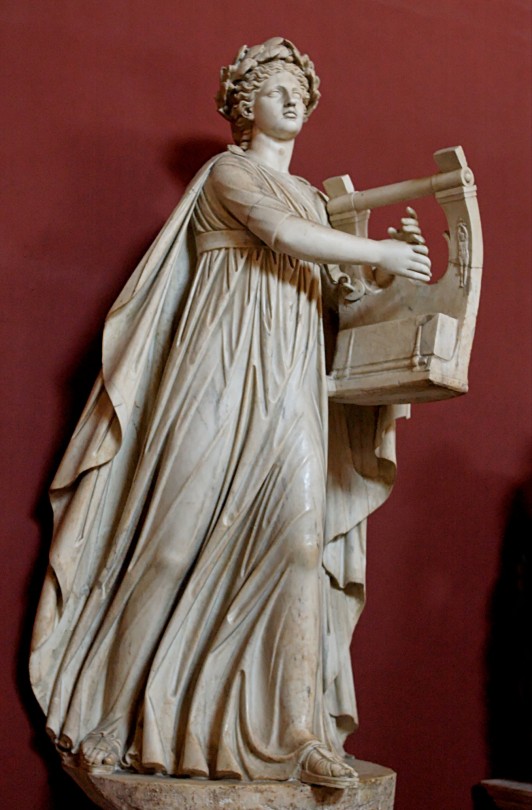
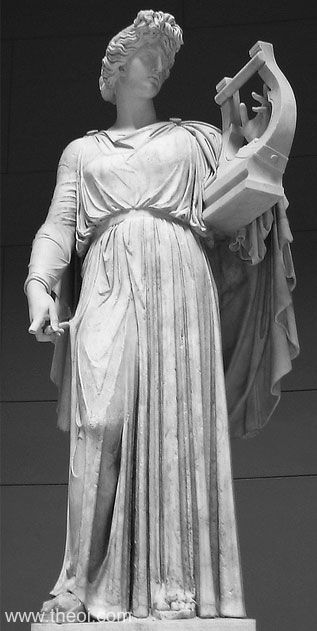
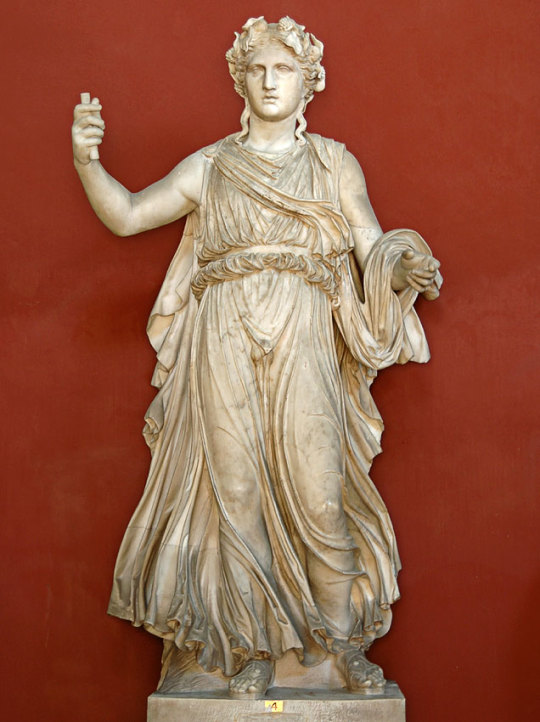

And then there are the other depictions reminding us that Apollo is, in fact, a man 😂 :
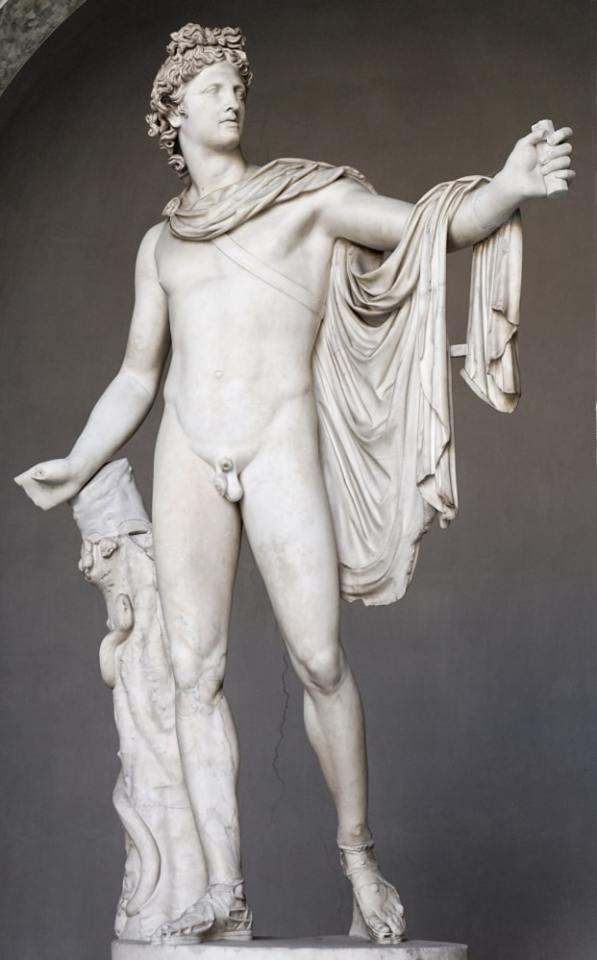
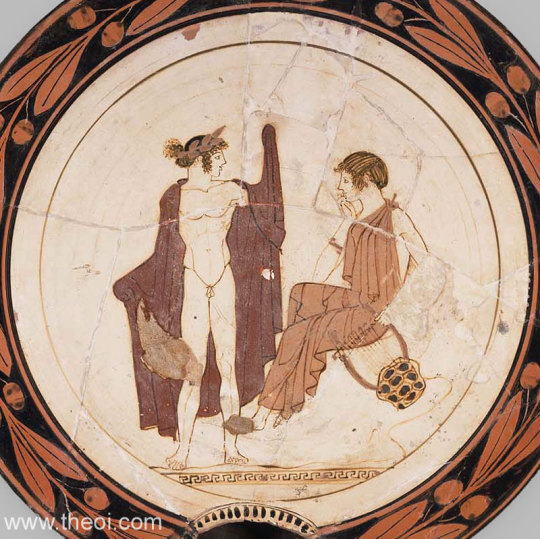
A man who always strikes the pose, but still a very manly man.
Seriously, look at some of his other depictions because some of them are really cool
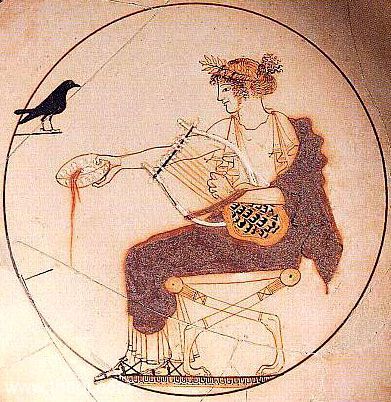
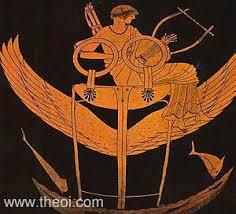
Apollo giving us some concerts. Look at his nice lil' bun and toga on the first. And the second looks like he's actually playing his music on a decorated stage.
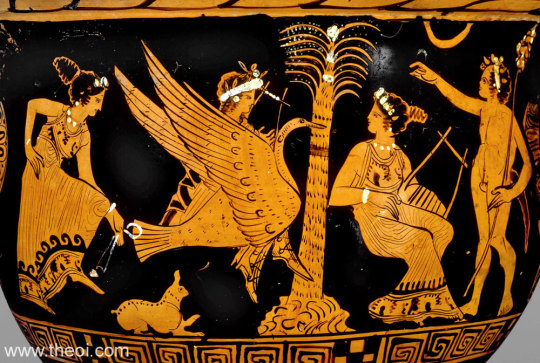
This is my favorite. Look at this diva ! Riding his swan, ready to give Marsyas the worst defeat he has ever known.
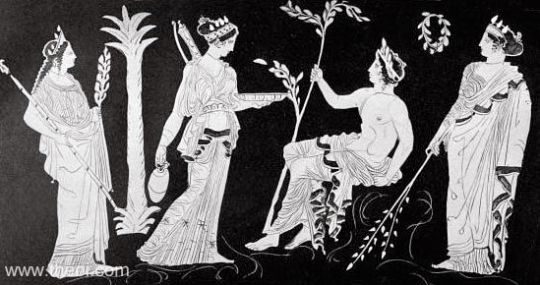
The whole Delian family looking fabulous (left to right : Leto, Artemis, Apollo, Asteria).
Here's another one of Leto and her twins being stylish :
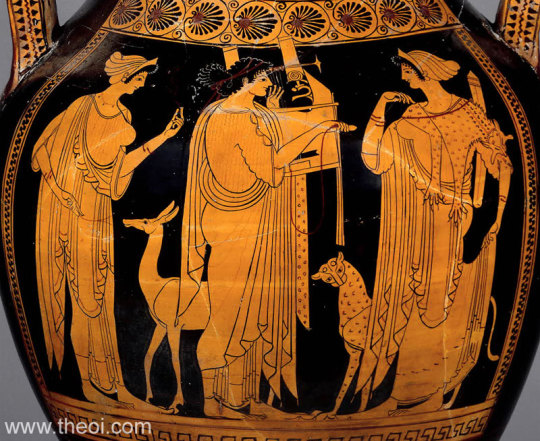
And while we're looking at Artemis :
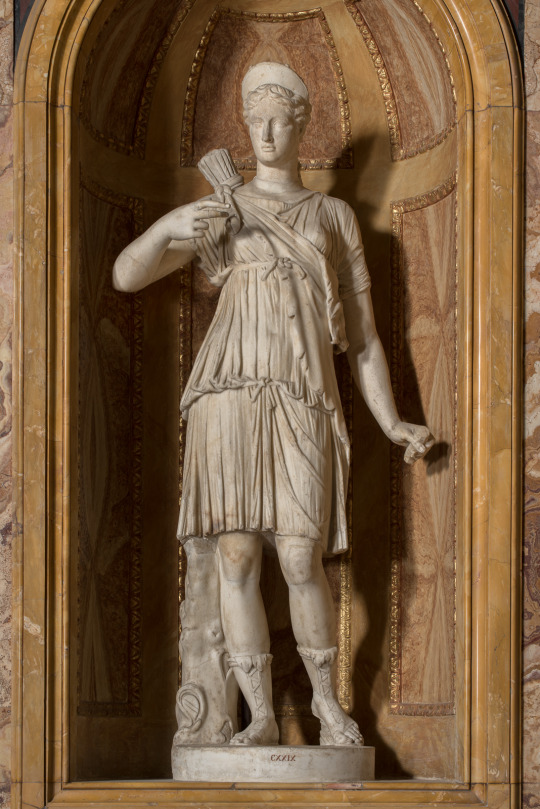
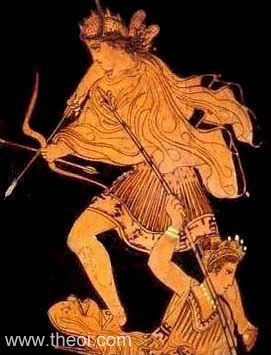
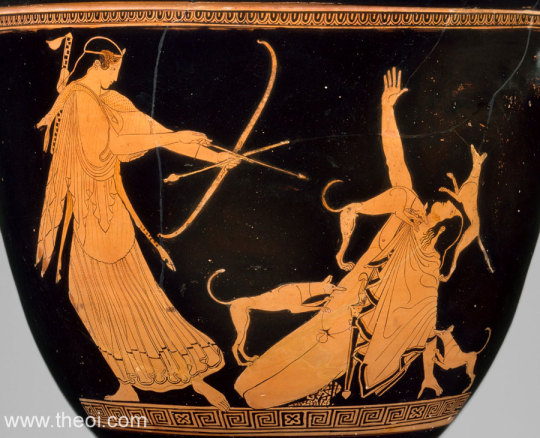
How Artemis is often depicted : menacingly holding her bow and arrow
How Apollo is often depicted : strikes a pose with his lyre
I love both of them so much.
Another comparison that I already mentioned but still find funny is this one :
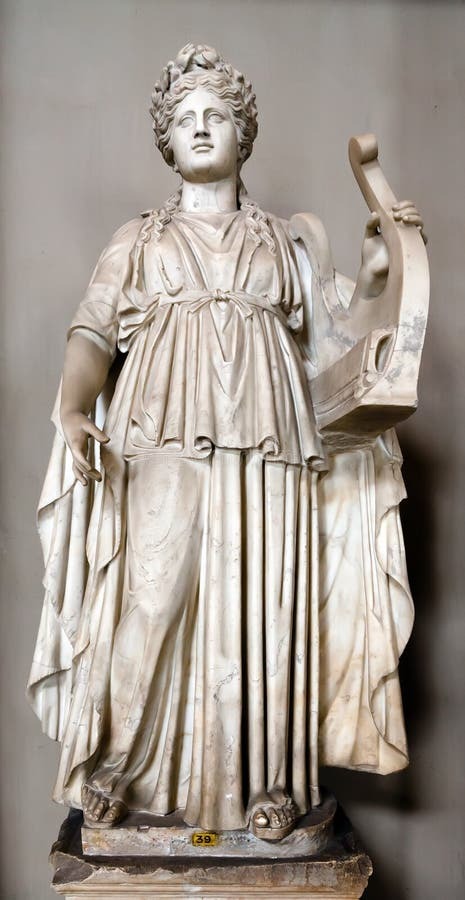
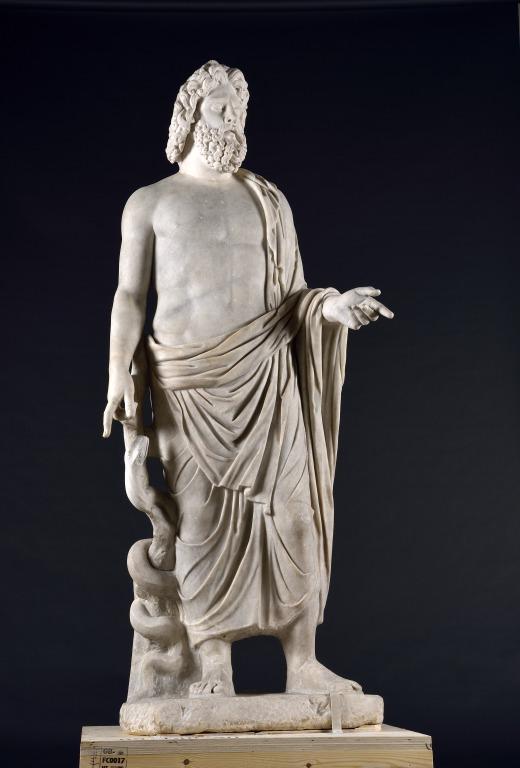
Apollo looking way younger than his own son will never not be funny🤣🤣. Even when deified. Imagine, out of context, this middle-aged man pointing to that pretty boy posing with a lyre being like : "This is my father". Lol
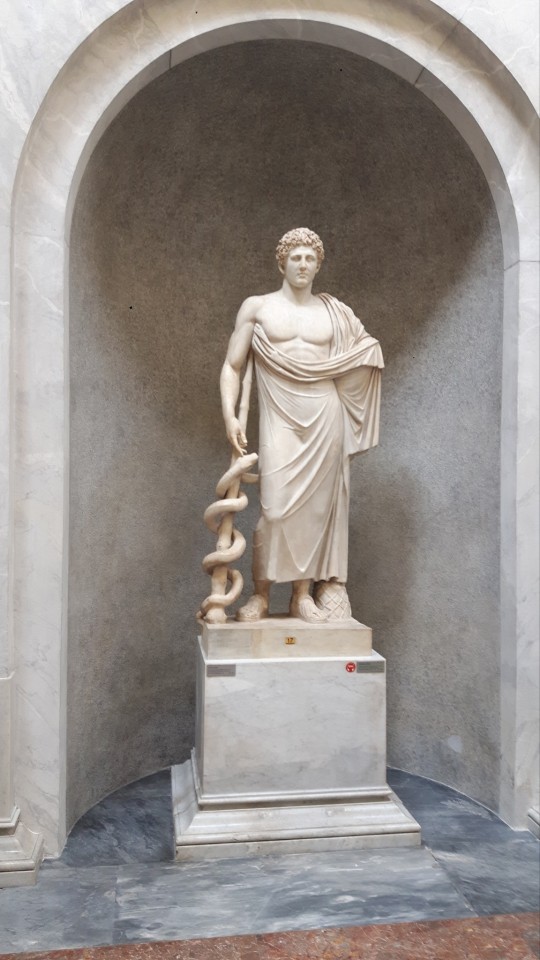
Why does Asclepius still look older than his father even without the beard 🤣🤣.
Also, the fact that Apollo was never portrayed with a beard despite the fact that other youthful deities like Hermes or Dionysus sometimes are, is remarkable. I'd say it's because he represents young men in general, whereas all the others mentioned don't.
To conclude : Apollo statues are a vibe and I want an adaptation depicting Apollo in any of these poses ASAP (especially the swan).
#apollo being a fashion icon#apollo#greek mythology#greek myth discussion#artemis#delian twins#asclepius#leto#phoebus apollon#not a reblog
40 notes
·
View notes
Note
Hey, @imaginelovelive I'd also like to know if you mean books based on mythology, adaptations or just the source material ?
Because for the latter, I either recommend checking out the website Theoi for shorter myths that are in multiple versions or simply reading translations of plays and/or epics.
For exp, Homer's the Odyssey and the Iliad, Nonnus for the Dionysiaca. Aristophanes for his comedies or the big 3 tragic playwrights Euripides, Sophocles and Aeschylus. Among them being the Bacchae and Medea that @cynicalclairvoyantcadaver mentioned, which are great for understanding figures that adaptations tend to portray badly. Also Euripides does a wonderful job in characterization, in my opinion.
For exp, Dionysus is often stripped of his more powerful and intimidating side, while Medea's actions are interpreted in multiple ways that may not reflect the original intention but a more modernist perspective (which I don't always agree with because the main message should be preserved, but that's my opinion).
Latin sources can also be very interesting if one wants a more complete knowledge of how these stories develop over time. We should just differentiate them from the Greek ones if the portrayals enter in conflict. That's why I dislike when Ovid's version Medusa is used in adaptations (especially because it's used all the time and I'm sick of it). However, I don't mind other latin sources that just add details instead of changing everything. These new details can add some fascinating meanings, even if they come from Ovid.
Though even for latin sources, Ovid himself is more biased, so it's best to be careful when reading his work.
For mythology-based stuff, that explains the mythology but being a second-hand source, it depends.
There's a series of books like Perseus by Daniel Ogden or Apollo by Fritz Graf that go over some figures of mythology in detail, one per book. I liked reading through them and they make up quite complete introductions to these figures.
One in another format I actually quite like is George O'Connor's comic series about the Olympian gods. They depict the deity with the full nuances they deserve (even Ares isn't demonized) and explore their stories. Also the artstyle is pretty cool.
As for adaptations, if I were to recommend accurate ones, there's honestly not that much of them. I know some fun stuff like Epic the musical or Hades but definitely recommend reading the sources first, Theoi or summaries if preferred, as both of these adaptations make a lot of creative liberties.
Edit : as @katerinaaqu gently reminded me, there are way more accurate adaptations out there. She talks about it on her blog :3
What other Greek mythology based books would you recommend
Greek Mythology based books? Well, if you're looking for stories like PJO, I don't know-
But I would really recommend reading the Odyssey and Iliad, even translated versions of them with easier-to-read language. I would also recommend reading Euripedes' Bacchae and his other works like Medea.
@margaretkart
@superkooku
@katerinaaqu
The tagged people will be able to recommend more books like the ones I listed above.
43 notes
·
View notes
Text
TW: Explicit Content
Let's make one thing clear: I don't read Greek Mythology Retellings. And by that I mean physical books. I read fanfictions, but I'm not willing to pay money for a book which you can instantly quess that it's mediocre only by looking at it. The common saying "Don't judge a book by it's cover." can be applied to anything but books.
So when I found out that there's a whole HxP book series that is trending on BookTok I decided that I will avoid it like the plague, especially after reading a Goodreads review which described it as "If the worst parts of Fifty Shades of Gray and LO had a baby."
Unfortunately, one of my classmates read it, and when I told her that I will never touch that book she sent me a link with one of the *ahem* scenes in order to convince me:

First of all, it seems like a 12yo kid wrote it. Seriously now, even my celibate ass could write better erotica than this. And second of all, what sequence is supposed to be romantic, exactly?
The worst part is that I'm also an up-and-coming med student, and one of the essential things that you're supposed to learn about the reproductive system is that you have to be "prepared" before getting penetrated. Lubrification begins only after the hormones send signals to the brain that you are sexually aroused and the vaginal glands start secreting fluids to help the process of penetration. Otherwise it feels painful and you risk to get injured. Not to mention the fact that if a someone gets inside you without at least giving you a sign then it could be considered rape.
So there's nothing passional or sensual in this scene, it’s straight up disturbing. Also, is it just me or does anyone else cringe when they read these sort of scenes even when they're alone? Honestly, I'm currently trying to comprehend the fact that there are people (especially girls) who would read this thing and be like 🥵🥵🥵 or something like that.
#greek mythology#greek gods#a touch of darkness#greek myth retellings#greek myth discussion#tw mature
7 notes
·
View notes
Text
I was casually rereading Euripides' Hippolytus (as one does) and then stumbled on this quote Phaedra says :

And this little quote alone is very interesting to analyze because it implies that
Phaedra meets Ariadne again after the Naxos incident, as she's already Dionysus' wife.
Theseus meets Ariadne again. And probably Dionysus too.
Phaedra knows Theseus abandoned Ariadne on Naxos. Even if she wasn't explicitly informed, Ariadne being alive and not married to Theseus should be enough for her to put everything together.
Phaedra thinks her sister is as miserable in her marriage as Pasiphae with the bull.
Since there is 0 proof of their wedding being unhappy, I'll interpret it as Phaedra being wrong for one or more reasons.
Maybe she sees how changed her sister is and worries for her, maybe she just panicked since this play is an emotional trainwreck for her, maybe she thinks that "Olympian god who turns women insane" isn't an ideal husband material.
And yes I also say that because I'm a hardcore Dionysus x Ariadne shipper.
Point is, I'd love to read a fanfic about these four interacting. Yes, it'll be super awkward (especially for Theseus) but oh so interesting. Juicy drama, both sisters and Theseus' learning the truth, seeing how the years affected them differently, while there's this powerful and dangerous deity right beside them (and Ariadne casually hanging out with him).
Also, add Hippolytus into the mix for more awkwardness and because I like the guy. (Also Ariadne learning Phaedra isn't even his mother would be funny 😅). Yk, typical Theseus shenanigans.
And the sisters reuniting could potentially be bittersweet, especially since Phaedra could be a bit protective of Ariadne, and her being worried of her sister's fate.
Edit : what if they discussed about Ariadne betraying her family for Theseus ? And her being abandoned ? The dramaaaaaa !
What do you think ?
If someone writes that fic, PLEASE tag me.
#greek mythology#greek myth discussion#phaedra#ariadne#theseus#dionysus#hippolytus#dionysus x ariadne#not a reblog
71 notes
·
View notes
Text
Seeing @sarafangirlart 's post about Kaos made me notice a new trend :

It's slightly better than dumb drunk but still removes the best elements about him: the frenzy, the madness, the terror, the liberation. Also, Dionysus participated in three mythological wars (Gigantomachy), two that he led himself (against Perseus and against India).
Dionysus, as the liberator and against inhibiting structures and figures of authority, immediately enters in conflict with every mortal king he meets (Pentheus, Lycurgus, Proteus, Labdacus, Perseus...) and always DISRUPTS the peace when he comes to their city.
He's not like "Hello my friends, can you worship me please 🥺 ?" His punishments are wild, seriously, some Eldritch horror stuff.
Also his great grandfather is literally ARES, I'm not even joking.
He's literally one of the worst candidates 😂.
Also, in Hades II, it's used as an excuse to remove him from the plot, which made me super upset (maybe the worst decision in the game. Right besides wrecking OdyPen).
For the peaceful god/goddess, choose Hestia, Eirene, Hypnos, Hebe, Asclepius idk, some chill deities that don't like to be involved in fights or exclusively helped people or stayed in the corner doing their own thing. Not the god who has crazy beast women as priestesses.
#this is NOT a “Dionysus is evil” post. there is a biiiig nuance between silly baby and satan. Dionysus would be right in the middle imo#btw Theseus is incredibly lucky to never have met Dionysus#he's a king AND Ariadne's ex... that wouldn't have ended well#greek mythology#dionysus#dionysos#greek myth discussion#rant#not a reblog
89 notes
·
View notes
Text
Persean task : when someone gives you an incredibly difficult task in order to get rid of you (not necessarily a deadly one. Just something distracting enough)
the fact that we only have “herculean task” and “sisyphean task” feels so limiting. so here’s a few more tasks for your repertoire
icarian task: when you have a task you know you’re going to fail at anyways, so why not have some fun with it before it all comes crashing down
cassandrean task: when you have to deal with people you KNOW won’t listen to you, despite having accurate information, and having to watch them fumble about when you told them the solution from the start (most often witnessed in customer service)
feel free to chime in i ran out of ideas much faster than i anticipated
113K notes
·
View notes
Text
It's just so funny how many stories we have of Dionysus DYING.
You'd think an immortal god wouldn't get killed so much.
(Correction from 3/11/2024 : the Perseus and Lycurgus anecdotes are from rarer versions of the myth, not the common one, but it's still interesting to explore it either through an abstract lense or just "Dionysus' defeat")
First, orphism. Where Zagreus is dismembered by the Titans, whom Hera sent. He's then reborn.
Then, Perseus slaying him in their war against each other (right after Ariadne). And Hera's involved both times.
Finally, one version of Lycurgus' myth where the king kills Ambrosia, one of his caregivers and then a young Dionysus is forced to jump in the water. Well, it's not said he died as Thetis saved him and the others from drowning, but still...
And then he comes back to get revenge on Lycurgus and that man is horrified to see him again, because he literally killed him. That alone would make him go insane, and Dionysus just relishes in his victory.
Another detail: it's never stated how and if he comes back to life after Perseus' victory. He's buried at one point, but since he's a god, of course he has to somehow be resurrected.
So i'm just imagining him raising from the dead and terrifying everyone in the process. Just digging himself out of a grave and being like "Oh... I died again? That's starting to get annoying."
I don't think Perseus would be afraid, though. Dionysus' shenanigans never impressed him that much and he has seen many things. He'd probably be aggravated and they'd make up at this moment.
Dionysus, buddy, you rightfully earned your title of "god of death and rebirth".
And I'm not saying Dionysus is weak or anything, he was very young in 2/3 of the stories and Perseus is just that goated (and the city of Argos was sacred to Hera , so it wouldn't be a stretch to imagine her helping Perseus win like Athena with Diomedes.
But he probably just did it on his own, which is an enormous feat !)
And Dionysus has his fair share of victories (in the Gigantomachy, against Pentheus, Lycurgus the revenge, against INDIA as a whole, etc...)
Dionysus' death is just some recurring theme that makes his story even more interesting and ties him to his human origins, with Semele.
124 notes
·
View notes
Note
Nothing is more funnier to me than the fact Odysseus was butt naked killing the suitors. Imagine your dad coming back after 20 years killing the people who tormented you and your mother and your first impression of him is his dick n balls out shooting the suitors down like that one guy in the Olympics who shot with one hand
Honestly yeah, it's super funny 😂. Odysseus showed his whole might, completely taking off his disguise. Any disguise. Even regular clothes. No armor, nothing, he just had his bow and arrow. And yet he killed 108 fully clothed suitors. This is his house, his rules. What a chad !
Honestly Telemachus had the time of his life this day : his father is back, naked, but still he's back, the suitors are dead, so I think that detail wasn't the most relevant.
@katerinaaqu could you provide me with a more in-depth interpretation, please ? I'm curious.
45 notes
·
View notes
Note
Favorite character from Greek mythology + favorite myth from Greek mythology?
Favorite characters
I'll turn this into a tag game : @margaretkart @dootznbootz @sarafangirlart @aliciavance4228 @katerinaaqu @hermesmoly @go-rocksquadsfan @sanska @vint-knight .
And @anon (you can give your answer in another ask 😉).
So, I have a loooooooot of faves. This list is long.
Here are mine :
Nobody. Yeah, in reality, I hate mythology and just pretend I like it. Or I just love making puns about my favorite lying war criminal. Who didn't cheat btw.
Penelope. These two are soulmates, no ifs or buts. I always found her underrated and @dootznbootz 's ramblings on her confirm that. Cunning and sassy half-naiad queen.
"The delian twins", as I like to call them. Idk I really love their multifaceted natures of protectors and deadly huntress/inflictor of illnesses (with an affinity towards plague). And their familial bond is precious. And I like them both equally, even though I talk about Apollo a bit more ig.
Leto. She's precious. They're always ready to defend each other. Like when Apollo and Artemis killed Niobe's kids because she was disrespectful to Leto. Or when Leto came in to save her son from being thrown in Tartarus by Zeus. Or when baby Artemis helped her mother deliver her brother. She fought for her children and now they fight for her.
Hestia. Too bad there isn't more about her because I relate a lot to the concept of chilling at home and staying away from drama.
Ariadne. Because of her family's tragic history, her healing from it with Dionysus (in most versions) and overall, she's great. Also, it's funny how Theseus wanted to marry a child of Zeus but his ex girlfriend actually succeeded 😂. Speaking of her family tragedy...
Asterius. I bet most adaptation authors don't know who I am referring to 🤣. He's a man-eating monster, yes, but he grew up isolated, trapped and unloved. I feel so bad for him.
Perseus. The GOAT. Partly thanks to @sarafangirlart. I already liked him since I always knew he wanted to save his mother, but he genuinely grew on me since I read her posts. That and when I learned of his war against Dionysus. Extremely underrated story.
Athena. Idk I don't think I need to elaborate on why she's cool.
Hades. In retellings, I often hate him because he's either woobified or made into "Greek Satan" (at least in Disney he's fun), but he's genuinely cool in mythology. Morally gray Hades save me.
Hermes. From birth, he was always a little trickster. I love how many functions he has (messenger of the gods, god of merchants, thieves, communication, also a psychopomp btw). A very energetic and helpful god.
Asclepius. I think I should make a post explaining why he's great because, yeah, I don't talk much about him even though there are things to say (yeah it's because I did a lot of research on him).
And... finally... Dionysus 🤣. Of course he made it in this list. I dedicated a whole essay series about this god, come on !
Honorable mentions : Hector, Andromache, Menelaus, Demeter, Telemachus, Hephaestus, Hippolytus, Danae, Ares and many others.
Favorite myths/plays/poems
I already answered that but can't find the post. So I'll do it again, with some new answers in mind. Basically "the myths with the characters on the list".
It's either because they're that compelling or just hilarious.
The homeric cycle. Ok, an easy one.
The Bacchae by Euripides (mandatory reading if you want to understand Dionysus imo. No excuses).
The frogs by Aristophanes. Because it's funny.
Asclepius' story. Seriously I'll elaborate on it one day.
Hermes' birth story. Him stealing Apollo's cows and Apollo getting mad at his scallywag of a brother 🤣🤣. And then just him winning Apollo over with the lyre.
Pirithous and Theseus getting their asses stuck on a chair (yes this is my title for this story). I love to mock these two, especially Pirithous because... give this man a Darwin award please. No thoughts and no survival instincts in his brain 😂.
Orpheus and Eurydice. Simple but powerful.
The Argonautica. Aka a huge crossover. Seeing more interactions between all these heroes would be awesome (especially if we take every version into account 👀. So many faces...). It's funny how I love the Argonautica but never talk about Jason himself 🤣🤣. The embodiment of the protagonist who's less interesting than the other characters.
Perseus' war against Dionysus. A potential retelling about this myth would go so hard !! Especially since we could get a scary Dionysus. Hopefully it doesn't get ruined :(
Edit : some English mistakes I had to correct.
#greek mythology#greek myth discussion#ask#maybe i don't talk that much about Asclepius because he's not disrespected in adaptations#he's inexistent most of the time and that's a shame. which is why I chose to write up something about him btw#not a reblog
43 notes
·
View notes
Text
Shout-out to this very informative post (and thank you for citing sources). I myself learned quite a lot from it.
Listen, I'm also against uselessly demonizing Ares, I even have an "Ares defense squad" tag. But it doesn't mean Ares is a perfect little cinnamon roll 😂. He's a god of war, with every implication surrounding war, we shouldn't expect him to be sweet and unproblematic.
What I disagree with is painting him as "evil stupid war dude" (like Satan Hades), to ignore all nuance about his character and title and to paint Athena as a saint in comparison to him.
And also when Wonder Woman made Athena the patron of the Amazons (though DC isn't really pretending to be mythologically accurate, so it's a bit less jarring).
But, on the other hand, there's this post I'd love to add on. We shouldn't use Ares' (apparent) lack of SA myths to demonize other gods like Zeus or Hephaestus.
In the same way Hades and Persephone aren't a perfect uwu couple in comparison to Zeus and Hera, Ares is not the cutesy feminist himbo.
He may be excessively evil in some adaptations, he may have a complicated relationship with Zeus, he's definitely misunderstood but concluding that he's a cinnamon roll is not the way.
Also, just a reminder that Zeus also threatened to throw Apollo in Tartarus and is often the one throwing Hephaestus from Mt. Olympus, instead of Hera.
(and no, this is not a Zeus hate post)
Conclusion : if you deem Greek mythology to be problematic, then the best solution, imo, would be to read something else instead of trying to fundamentally change everything.
And except Hestia (through her passivity), there's absolutely zero Olympian who didn't do some morally dubious (at best) actions and inflict terrible punishments. I'll repeat it again : they're all nuanced cultural figures who need to be treated as such.
ARES IS NOT THE PROTECTOR OF WOMEN IN GREEK MYTHOLOGY.
He is never presented as such in any source, there is no evidence such a role was ever assigned to him in any account, and as far as I'm aware this popular yet unattested assertion is born from the echo-chambers of tumblr. In fact quite the opposite could be argued. TW for sexual assault.
This baffling claim seems to originate from a sort of shallow examination of the way Ares "behaves in myth", and the following arguments are the most frequently presented:
1. Ares protects his daughter Alkippe from assault, and is therefore morally opposed to rape. (Apollodorus 3.180, Pausanias 1.21.4, Suidas "Areios pagos", attributed to Hellanikos)
Curiously this argument is never applied to, for example: Apollo for defending his mother Leto from Tytios, Herakles for defending Hera from Porphyrion (or his wife Deianeira from Nessos), or Zeus for defending his sister Demeter from Iasion (in the versions where he attacks her), among other examples. The multiple accounts of rape of the previously mentioned figures did not conflict with these stories in greek thought: they're defending family members or women otherwise close to them. This sort of behaviour is not uncommon, even in contemporary times, e.g. a warrior has no ethical problem killing men, but would not want his own family or loved ones to be killed. The same goes here for sexual assault.
2. There are no surviving accounts of Ares sexually assaulting anybody.
The idea that the ancient greeks pictured that, among all the gods, Ares was the only one who shied away from committing rape borders on ridiculous. In this case absence of evidence is not evidence of absence.
The majority of surviving records of Ares' unions are presented in a genealogical manner, and do not go into details about the nature of said unions. This is by no means uncommon for most mythographers, where most sexual encounters are presented as such, and details of specifics are to be found elsewhere. However, common motifs that are found in other accounts of rape also appear in stories concerning Ares' relationships, e.g. tropes like shape-shifting/the use of disguises, the victim being a huntress, secrecy, and the disposal of the concieved child, are to be found in the stories of Phylonome and Astyoche respectively:
Φυλονόμη Νυκτίμου καὶ Ἀρκαδίας θυγάτηρ ἐκυνήγει σὺν τῇ Ἀρτέμιδι: Ἄρης δ᾽ ἐν σχήματι ποιμένος ἔγκυον ἐποίησεν. ἡ δὲ τεκοῦσα διδύμους παῖδας καὶ φοβουμένη τὸν πατέρα ἔρριψεν εἰς τὸν Ἐρύμανθο
"Phylonome, the daughter of Nyktimos and Arkadia, was wont to hunt with Artemis; but Ares, in the guise of a shepherd, got her with child. She gave birth to twin children and, fearing her father, cast them into the [River] Erymanthos." (Pseudo-Plutarch, Greek and Roman Parallel Stories, 36)
οἳ δ᾽ Ἀσπληδόνα ναῖον ἰδ᾽ Ὀρχομενὸν Μινύειον, τῶν ἦρχ᾽ Ἀσκάλαφος καὶ Ἰάλμενος υἷες Ἄρηος οὓς τέκεν Ἀστυόχη δόμῳ Ἄκτορος Ἀζεΐδαο, παρθένος αἰδοίη ὑπερώϊον εἰσαναβᾶσα Ἄρηϊ κρατερῷ: ὃ δέ οἱ παρελέξατο λάθρῃ: τοῖς δὲ τριήκοντα γλαφυραὶ νέες ἐστιχόωντο.
"And they that dwelt in Aspledon and Orchomenus of the Minyae were led by Ascalaphus and Ialmenus, sons of Ares, whom, in the palace of Actor, son of Azeus, Astyoche, the honoured maiden, conceived of mighty Ares, when she had entered into her upper chamber; for he lay with her in secret" (Homer, Iliad 2. 512 ff)
In neither of these cases is a verb explicitly denoting rape used, though it is heavily implied by the context. The focus of the action is on the conception of sons, the nature of the interaction is secondary.
Other examples are found among the daughters of the river Asopos, who where (and here there's no confusion) ravished and kidnapped by different gods to different parts of the greek world, where they found local lines through children borne to their abductors and serve as local eponyms. Surviving fragments from Corinna of Tanagra tell:
"Asopos went to his haunts . . from you halls . . into woe . . Of these [nine] daughters Zeus, giver of good things, took his [Asopos'] child Aigina . . from her father's [house] . . while Korkyra and Salamis and lovely Euboia were stolen by father Poseidon, and Leto's son is in possession of Sinope and Thespia . . [and Tanagra was seized by Hermes] . . But to Asopos no one was able to make the matter clear, until . . [the seer Akraiphen reveals to him] 'And of your daughters father Zeus, king of all, has three; and Poseidon, ruler of the sea, married three; and Phoibos [Apollon] is master of the beds of two of them, and of one Hermes, good son of Maia. For so did the pair Eros and the Kypris persuade them, that they should go in secret to your house and take your nine daughters." - heavily fragmented papyrus. Corinna, Fragment 654
"For your [Tanagra's] sake Hermes boxed against Ares." Corinna, Fragment 666
It seems that, similarly to the myths of Beroe or Marpessa, the abducted maiden is fought over by two competing "suitors", and though we can infer that the outcome of the story is that Hermes gets to keep Tanagra, apparently by beating Ares at boxing, we don't actually know what happened or how it happened. In any case, Ares does mate with another daughter of Asopos, Harpina, who bears him Oinomaos according to some versions (Paus. 5.22.6) (Stephanus of Byzantium, Ethnica, A125.3) (Diodorus Siculus, Library 4. 73. 1). There is little reason to suppose this encounter wasn't pictured as an abduction like the rest of her sisters.
The blatant statement that each of his affairs was envisioned as consensual is simply not true.
3. He was worshipped under the epithet Gynaicothoinas "feasted by women"
This was a local cult that existed in Tegea, the following reason is given:
There is also an image of Ares in the marketplace of Tegea. Carved in relief on a slab it is called Gynaecothoenas. At the time of the Laconian war, when Charillus king of Lacedaemon made the first invasion, the women armed themselves and lay in ambush under the hill they call today Phylactris. When the armies met and the men on either side were performing many remarkable exploits, the women, they say, came on the scene and put the Lacedaemonians to flight. Marpessa, surnamed Choera, surpassed, they say, the other women in daring, while Charillus himself was one of the Spartan prisoners. The story goes on to say that he was set free without ransom, swore to the Tegeans that the Lacedaemonians would never again attack Tegea, and then broke his oath; that the women offered to Ares a sacrifice of victory on their own account without the men, and gave to the men no share in the meat of the victim. For this reason Ares got his surname. (Paus. 8.48.4-5)
As emphasised by Georgoudi in To Act, Not Submit: Women’s Attitudes in Situations of War in Ancient Greece (part of the highly recommendable collection of essays Women and War in Antiquity), "it is not necessary to see the operation of an invitation in the bestowal of the epithet Γυναικοθοίνας on Ares". The epithet is ambiguous, and can be translated both as "Host of the banquet of women" or "[He who is] invited to the banquet of women". In any case no act of divine intervention occurs, and the main reason for the women's act of devotion lies principally in recognising their decisive role in the routing of the Lakedaimonians. They invite Ares to the banquet, the men are excluded.
Also this a local epithet that isn't found anywhere else in Greece. As such it would be worth reminding that not every Ares is Gynaicothoinas, in the same way not every Zeus is Aithiopian, not every Demeter Erinys, or not every Artemis of Ephesos.
4. He is the patron god of the Amazons
He was considered progenitor of the Amazons because of their proverbial warlike nature and love of battle, the same reason he was associated with other "barbaric" tribes, like the Thracians or the Scythians. In this capacity he was also appointed as a suitable father/ancestor for other violent and savage characters who generally function as antagonists (e.g. Kyknos, Diomedes of Thrace, Tereos of Thrace, Oinomaos, Agrios and Oreios, Phlegyas, Lykos etc.). Also he was by no means the only god connected with the Amazons (they were especially linked to Artemis, see Religious Cults Associated With the Amazons by Florence Mary Bennett, if only for the bibliography).
Similarly Poseidon was considered patron and ancestor of the Phaiakians mainly because of their mastery over the art of seafaring, and was curiously also credited in genealogies as father to monsters and other disreputable figures.
On another note I have found no sources that claim he taught his amazon daughters how to fight, as I've seen often mentioned (though I admit I'd love to be proven wrong on that point).
Finally, the last reason Ares is never portrayed as a protector of women is because of his divine assignation itself:
The uncountable references to his love of bloodshed and man-slaying don't just stop short of the battlefield, but continue on to the conclusion and intended purpose of most waged wars in antiquity: the sacking of the city. The title Sacker of Cities as an epithet of Ares (though it is by no means exclusive to him) is encountered numerous times and in different variations (eg. τειχεσιπλήτης or πτολίπορθος), and the meaning behind the epithet is plain. Though it is hard to summarise without being reductionist, the sacking of a city entails the plundering of all its goods, the slaughtering of its men, and the sistematic raping and enslavement of the surviving women (for the most famous depictions see The Iliad, The Trojan Women or The Women of Trachis, to name only a small few of the literary references). There is little need to emphasise that war as concieved of in ancient greece, especifically the brutal aspects of war Ares is most often associated with, directly entail sexual violence against women as one of its main concerns. The multiple references to Ares being an unloved or disliked deity are because of this, because war is horrifying (not because his daddy is a big old meany who hates him for no reason, Zeus makes very clear the motive for his contempt in the Iliad (5. 889-891): "Do not sit beside me and whine, you double-faced liar. To me you are most hateful of all gods who hold Olympos. Forever quarreling is dear to your heart, wars and battles.")
Ares was only the protector of women inasmuch as he could be averted or repelled (e.g. in this apotropaic chant):
"There is no clash of brazen shields but our fight is with the war god, a war god ringed with the cries of men, a savage god who burns us; grant that he turn in racing course backward out of our country’s bounds, to the great palace of Amphitrite or where the waves of the thracian sea deny the stranger safe anchorage. Whatsoever escapes the night at last the light of day revisits; so smite him, Father Zeus, beneath your thunderbolt, for you are the lord of the lightning, the lightning that carries fire. (Shophocles, Oedipus Tyrannos, 190-202)
~~~~~
All that being said, this is a post about Ares as attested and percieved in ancient sources, made especifically in response to condecending and self-victimising statements about how "uhmmm, actually, in greek mythology Ares was a super-feminist himbo who was worshipped as the protector of women and was hated by his family for no reason, you idiot". It is factually incorrect. HOWEVER, far be it from me to tell anyone how they have to interact with this deity. Be it your retellings, your headcannons or your own personal religious attachments and beliefs towards Ares, those are your own provinces and prerogatives, and not what was being discussed here at all (I personally love retellings where Ares and Aphrodite goof around, or art where he plays with his daughters, or headcannons that showcase his more noble sides, etc.)
~~~~~
I've seen that other people on tumblr have made similar posts, the ones I've seen were by @deathlessathanasia and @en-theos . I have no idea how to link their posts, but they're really good so go check them out on their pages!
1K notes
·
View notes
Text
Apollo: You could say I’m a really great athlete
Hyacinthus: [clutching bleeding head] Banned I tell you
#Strike 2#Apollo#drop it#put the discuss down#s: me#greek god sitcom#greek mythology#greek myth#greek gods#greek myth memes#incorrect greek gods#apollo x hyacinthus#apollo greek god#apollo <3#hyacinthus greek mythology#apollo and hyacinthus#hyacinthus#discus
124 notes
·
View notes
Text
I just realized something new about Asclepius
So there's this source about gorgon blood that I'm researching rn. I already knew its effects. The one that flows on one right side can preserve life and resurrect the dead and the left one is a deadly poison.
But what I just noticed is what Pseudo-Apollodorus' wording implies :

It's not said "which WAS used" but "which HE used to destroy people" and I find that little wording difference so interesting, because Asclepius is usually presented as a rather peaceful deity who, at worst, was too ambitious and a tad money-hungry and at best a savior figure for humanity. He even has the "Philolaios" epithet, meaning humanity lover or friend of humanity.
But this source states that Asclepius straight up killed people with that thing. Who ? I have no single clue. Especially since no other source points out to him doing anything but defying death and curing people.
It's so interesting to know that he probably had his wrathful moments too, even though those sources are surely lost to time.
Though his sons were in the Trojan war, so that could have a whole new meaning too (btw they're on the Greek side while Apollo was with the Trojans. Dramaaa !) I wonder if he played a role in it. They were suitors to Helen so that's the real reason, but still 🤔
I mean, angering someone like Asclepius would be pretty dumb since he's an anatomy expert, a pioneer in healthcare and is said to use medicinal herbs, etc... this guy knows 1000 ways to poison you or just make you sick enough to make your existence painful. And you'd probably also anger Apollo, considering he avenged Leto when she was upset and the whole cyclopes accident.
Then again, there are a lot of dumb people in Greek mythology so that's not impossible.
@gingermintpepper what do you think about this ?
#greek mythology#greek myth discussion#asclepius#not a reblog#trojan war#he probably wasn't involved. with his dad on one side and his boys on another it was best to just stay out of it 😂#apollo#machaon#podalirius
34 notes
·
View notes
Text
Odysseus and Calypso Were Lovers
As problematic as that sounds because WTF, hear me out because it's complicated and there's a lot to discuss. Trigger warning for sa. Also, not directly Epic: The Musical related; that's a whole other ballpark.
She trapped him on her island!
I'm not denying that nor am I denying how objectively messed up that is.
However, the captor and prisoner trope is one that does crop up in Greek mythology now and then. The most famous example I can think of is Hades’ kidnapping of Persephone. I have seen that situation blatantly called rape in the original story, and yet today, modern storytellers do like to revise that myth into a version that makes Demeter out to be an overbearing mother and Persephone's ‘kidnapping’ so to speak becomes an escape. Personally, I think that is a very graceful way to make a barbaric story a bit more palatable to modern audiences.
So regarding Odysseus’ situation where falling in love with his captor is problematic…my thought process runs as, “Fucking Greek mythology and its weird idea of what constitutes as a love story.”
As a result, I have no serious thoughts on the morality of certain figures of Greek mythology because they frankly come from a time period where the people had a very different culture and set of moral values and ideas on what was acceptable. Therefore, it's futile to judge their stories by my own modern moral compass.
Where in The Odyssey does it say they were lovers?
The main line I can't ignore that strongly implies the nature of their relationship is Odysseus' farewell to Calypso:
“The sun went down and brought the darkness on. They [Odysseus and Calypso] went inside the hollow cave and took the pleasure of their love, held close together.” - The Odyssey, Homer, translated by Emily Wilson.
Keep in mind, she’s already told him he’s free to go. He’s free to build his raft, she’s giving him supplies, and yet he says goodbye this tenderly. Note the absence of Calypso using magic to compel him. If you cherry-picked this line, you'd find a fond goodbye.
Odysseus’ Tears
A lot of people making the ‘Odysseus/Calypso was a non-consensual situation’ argument like to cite the line that Odysseus cried every day on Ogygia. And yes, he did weep every day he was there. But this is the full stanza.
“On the tenth black night, the gods carried me till I reached the island of Ogygia, home of the beautiful and mighty goddess Calypso. Lovingly she cared for me, vowing to set me free from death and time forever. But she never swayed my heart. I stayed for seven years; she gave me clothes like those of gods, but they were always wet with tears.” - The Odyssey, Homer, translated by Emily Wilson.
‘Beautiful and mighty….Lovingly she cared for me….she never swayed my heart.’ He speaks highly of her, not with hate or venom for her delaying him.
In my literature class where we read The Odyssey, the tears line was discussed and largely interpreted as Odysseus’ reaction to all the monsters he’d faced and losing all his crew and friends. The PTSD of a war veteran. From the cultural mindset of Ancient Greece, Odysseus was a king, and he failed his people when they all died under his command and he was unable to bring them home. Similarly, the hero Theseus was once king of Athens. He was usurped in absentia (Theseus being trapped in the Underworld at the time) and when he returned to his kingdom, he found another man on his throne, was forced to flee, and died a rather ignoble death when a supporter of his usurper shoved him off a cliff. So Odysseus being a king who let an entire fleet die under his watch is certainly grounds for shame to the point of tears in the eyes of the Ancient Greeks. And with an entire line-up of men attempting to court his wife and take his place, it drives home the idea that he was replaceable.
Also important to note: He’s still miserable when he leaves Ogygia. When he arrives at King Alcinous’ court, he is welcomed, provided food, shelter, and entertainment, but when the king checks in with his heartbroken guest, he pleads with him to tell him what’s wrong, which kickstarts the telling of Odysseus’ journey.
Odysseus was afraid of Calypso!
That said, it's also important to address this concept because this is Odysseus' reaction to the goddess telling him she is sending him on his way to Ithaka:
‘Goddess, your purpose cannot be as you say; you cannot intend to speed me home. You tell me to make myself a raft to cross the great gulf of ocean--a gulf so baffling and so perilous that not even rapid ships will traverse it, steady though they may be and favoured by a fair wind from Zeus. I will not set foot on such a raft unless I am sure of your good will--unless, goddess, you take on yourself to swear a solemn oath not to plot against me any new mischief to my ruin.’ The Odyssey, Homer, translated by Shewring.
His suspicion certainly suggests mistrust and fear that she intends to do him harm, and considering his track record of being hated by deities, that's understandable. This isn't exactly what you'd call a loving relationship. But this also brings up a weird contradiction in the poem. I would 100% say this was a completely non-consensual situation were it not for this line:
His eyes were always tearful; he wept sweet life away, in longing to go back home, since she [Calypso] no longer pleased him. - Wilson.
Not ‘she did not please him.’ She no longer pleased him. That implies she 'pleased' him at one point and because of that, one could argue Calypso was a mistress and Odysseus eventually tired of her. (Probably long before seven years had passed.)
What Do The Translators Say?
I can't speak for all translators, but in the Emily Wilson translation, she includes a lengthy introduction describing Odysseus' world, the culture of Ancient Greece, the reasoning behind specific English wordage in the translation, etc. In the introduction, she refers to Calypso and Circe as Odysseus' affairs. Not his abusers. He also has a brief flirtation with Princess Nausicaa, the daughter of his final host, King Alcinous. Wilson then goes on to describe how these affairs are not a character failing of Odysseus in comparison to the treatment of Penelope where she is expected to be faithful and how that is indicative of a good woman.
Taking a step back from Greek mythology, consider the actions of King Henry VIII of England. Most historians agree that, for the first few years, the king's relationship with his first wife Katherine of Aragon was unusually good for the times. And yet he was an unfaithful husband, had at least one acknowledged bastard and historians speculate there were more. But while 'indiscretions' such as this were frowned upon in the Tudor Period, Henry VIII did not receive near as much criticism as Queen Katherine would have if she'd had an illegitimate child. If Katherine was 'indiscreet,' that was considered treason because she compromised the legitimacy of the succession and that was cause for a beheading.
Because misogyny. Again, different time, different moral values.
Misogyny in The Odyssey
Whatever one's thoughts on Calypso are, it is incredibly misogynistic of Homer to solely blame her for keeping Odysseus trapped while he conveniently ignores the plot hole that her island is completely surrounded by ocean and we all know that Poseidon was lurking out there just waiting for his shot at vengeance. Odysseus is barely two stanzas off Calypso’s island before Poseidon goes after him. It’s almost hilarious how quickly it happens. The poem says Poseidon was returning from Ethiopia, not that he was there for the whole seven years, and Hermes clearly did not pass along the memo that Odysseus was free to return to Ithaka. Although I like to imagine it was Zeus who forgot about Poseidon’s grudge against Odysseus, and Hermes, being the mischievous scamp that he is, did not remind him.
If one line in the text says Odysseus/Calypso was consensual while another says otherwise, which is it?
Honestly, I don't think there's a conclusive answer with just The Odyssey. I'm a hobbyist, not an expert, so I do refer to the judgment of translators like Wilson to make that call. If she and other translators say Calypso and Circe were affair partners and I can see the lines in the text to support that, I'll believe it and chalk up the rest as Greek mythology being problematic.
That said, we can also look at the opinions of other Greek poets in their further writings of the mythology:
“And the bright goddess Calypso was joined to Odysseus in sweet love, and bare him Nausithous and Nausinous.” - The Theogony; Of Goddesses and Men, Hesiod, translated by Evelyn-White.
“… after brief pleasure in wedlock with the daughter of Atlas [Calypso], he [Odysseus] dares to set foot in his offhand vessel that never knew a dockyard and to steer, poor wretch…” - Alexandra, Lycophron, translated by Mair.
Both seem to be of the opinion Calypso was Odysseus' lover.
Interestingly, Hesiod also writes in The Catalogues of Women Fragment:
“…of patient-souled Odysseus whom in aftertime Calypso the queenly nymph detained for Poseidon.” - The Catalogues of Women Fragment, Hesiod, translated by Evelyn-White.
The wording ‘detained for Poseidon’ implies Calypso was acting at Poseidon’s command or she was doing the sea god a favor or she possibly didn't have any free will herself whether or not Odysseus stayed on Ogygia. Either way, it does neatly account for Homer's aforementioned misogyny/plot hole.
But if Hesiod and Lycophron's works are not part of The Odyssey, why should we take them seriously?
You don't have to consider them canon. Just because I prefer to consider all mythology canon doesn't mean anyone else does. Just as easily, I could ask why we should take Homer's work seriously even though historians can't even agree whether or not he was a real person.
The truth is, Ancient Greece as we think of it lasted a thousand years. Their culture/values changed several times and so did their stories to reflect those changes, and those stories continue to evolve to the modern day. Odysseus himself goes through a few different descriptions over the centuries, being described as scheming and even cruel in other works. So I consider modern works like Percy Jackson, Epic: The Musical, Son of Zeus, and so on to be just more cogs in the evolving narrative. Much like how retellings of Hades and Persephone are shifting to circumstances easier to accept by audiences today.
But why would Odysseus be unfaithful to his loving wife?
The loving wife he claimed as payment for helping out King Tyndareus? Yeah...Odysseus and Penelope's relationship may not quite be the undoubted loving one modern retellings make it out to be nor is Odysseus a saint in The Odyssey.
“A blast of wind pushed me [Odysseus] off course towards the Cicones in Ismarus. I sacked the town and killed the men. We took their wives and shared their riches equally amongst us.” - The Odyssey, Homer, translated by Emily Wilson.
Raiding a town unprovoked, killing the men, kidnapping the women, stealing their treasure is not indicative to what we in the modern day consider heroic or good protagonist behavior. Also, at the end of the Trojan War, Queen Hekuba was made a slave and given to Odysseus.
As for the chapter with Circe, Penelope's name isn't even mentioned. Moreover, the wording of the Wilson translation gives the troubling connotation that Circe may have been the one who was assaulted.
Hermes’ instructions to Odysseus are as follows:
"...draw your sharpened sword and rush at her as if you mean to kill her. She will be frightened of you, and will tell you to sleep with her." - Wilson
She'll be frightened of him? Hermes is encouraging Odysseus to render Circe powerless by eating the Moly plant so she can't turn him into a pig, then threaten her with a sword, which does frighten her, and then sleep with her. That line of events is disturbing. Circe is the one who offers to take Odysseus to bed, sure, but there’s a strange man in her house, she’s allegedly afraid according to Hermes, and she’s unable to resort to her usual defense and turn him into a pig as she did with the others. Under those circumstances, sleeping with an invader is a survival tactic.
However...after Odysseus makes Circe promise to turn his men back, she bathes him and gives him food like a proper Ancient Greek host. Yet before Odysseus accepts the meal, he puts his men first, saying he can't bear to eat until he knows they're well. So Circe turns them back, then Odysseus returns to where the rest of the crew are waiting on the shore. They're all convinced their comrades are dead until Odysseus tells them what transpired and they rejoice. All except suspicious Eurylochus who calls them fools for trusting Odysseus' word based on his previous bad decisions. Odysseus thinks about cutting his head off for speaking that way. Damn, that went from zero to a hundred fast.
But Penelope's name is missing from the story.
Odysseus only thinks of leaving Circe's island when his men speak of returning to their homeland, after which he goes to Circe about the matter, and she instructs him to go to the Underworld.
"That broke my heart, and sitting on the bed I wept, and lost all will to live and see the shining sun." - Wilson
Odysseus and his men all lament the idea of sailing into the land of the dead. So his tears and despair did not start with Calypso. Also, they return to Circe's island after the journey so she can help them make sense of Tiresias' instructions.
But setting all that aside, even when Hermes instructed him on what to do, Odysseus didn't make some grand speech on how he can’t betray his wife. He doesn’t specifically say he’s crying for Penelope on Calypso’s island. He doesn’t mention Penelope at all, and when King Alcinous asks him about his sorrow, Odysseus tells his whole story, barely bringing up his wife or his love for her.
So is Odysseus a good guy?
In all, Odysseus is a clever character who is known for using his wits to get out of any situation. Polyphemus, the Sirens, Scylla, he had a plan. The idea that he’s suddenly helpless against Calypso and Circe is out of character. They may be goddesses, but they’re not exactly the heavy hitters of the pantheon, which is why Poseidon could absolutely order a minor sea nymph to stop what she’s doing and hold a man prisoner for him. And while Odysseus spends the entire story being thwarted by the gods, one could say he also thwarts the gods right back by refusing to give up.
Like most Greek heroes, I would say Odysseus is not what we today would call a hero. But when he shares a roster with characters like this:
Zeus: Serial rapist
Poseidon: Serial rapist
Hades: Kidnapped Persephone (setting aside modern interpretations she went with him willingly)
Herakles: Raped a princess named Auge (Yes, really.)
Theseus: Kidnapped Helen of Sparta when she was a child because he wanted to marry a daughter of Zeus, aided and abetted his cousin in an attempt to kidnap Persephone, abandoned Ariadne, etc.
Jason the Argonaut: Tried to abandon his wife. (I say ‘try’ because he didn’t get the chance. His wife Medea killed the other woman first.)
Hephaistos: Raped Athena after she refused him.
Achilles: Murdered a child to prevent a prophecy from coming true.
...Odysseus's atrocities are weirdly tame by comparison. Even the narrative where he kills the infant Prince Astyanax, modern retellings usually give that role to the lesser known Neoptolemus. More on that here.
In the end, it's not necessarily thematically important whether or not Odysseus is good or bad. The core of his character revolves around his cleverness and ability to build and strategize and make his own way in the world he lives in. Rounding this out is Emily Wilson's commentary on the symbolism behind the tree bed,
"In leaving Calypso, Odysseus chooses something that he built with his own mind and hands, rather than something given to him. Whereas Calypso longs to hide, clothe, feed, and possess him, Athena enables Odysseus to construct his own schemes out of the materials she provides." - The Odyssey, Homer, trans. by Emily Wilson, Introduction Pg 64.
So were Odysseus and Calypso lovers?
Based on the above, my opinion is 'Yes they were, but with the caveat they were problematic af.' Because problematic themes like that are pretty par for the course in Greek mythology.
#greek mythology#discussion#odysseus#calypso#problematic myths#analysis#emily wilson#shewring#the odyssey#translation#greek poets#homer#lycophron#hesiod#please be civil in the reblogs and comments#i understand this is a whole debate#i'm not here to argue about it#I just want to present what I know based on my own research#I highly recommend reading Wilson's entire introduction#she covers a lot more information than I could for a single post
100 notes
·
View notes
Text
🤣🤣🤣🤣. Asclepius looking way older than his dad is a fact. I mean, look at this :


Imagine some kind of young adult calling a middle-aged man "my baby boy" ���
Asclepius and his father.

#prev tags#aksjsks the comedic potential of this#Lucian has brought this up in his satires at least twice#but that aside this is sweet#the lil lizard on Apollo's arrow...sauroctonus reference <3#i love that even though he looks younger Apollo still has his arms protectively around his son#< prev tags#apollo#phoebus apollon#asclepius#greek mythology#greek myth discussion#greek myth art
2K notes
·
View notes
Text
"…Do you like snakes?" The question is innocent, natural. It sprouts up from the well of Ares' mind and passes through his lips like pollen on a careless breeze. Apollo isn't angry at it. He isn't even a bit surprised. It doesn't stop his instinctual flinch, doesn't stop that phantom scent of venom and stale blood from clogging up his nose. "I'm actually rather afraid of them." Ares looks up from where he's beating his brush into the marble, his frown more a pout as he glares at Apollo, "I thought you couldn't lie? Everyone knows you're not afraid of snakes." He sniffs, annoyed and testy, bangs his brush against the marble again ruining its sable brush-hairs for good this time, "You don't have to make up nonsense to try and make me feel better." Apollo very patiently does not bang Ares' head into the marble for destroying one of his most precious paintbrushes. As a child who has not yet partaken in the hunt, he knows not the skill it takes to capture a mink, nor the labour that goes into plucking their hairs, nor the artistry that comes from binding those fine hairs to a suitable piece of etched birch. Instead, he dips his own paintbrush in the setting salve and pointedly paints in large, obvious and even strokes, "It's not nonsense. I do not like snakes." "But you killed Python." Ares digs into the salve and spills thick globs of it about the floor like a boar at the trough. Apollo graciously notes that next time, he'll endeavour to put old linens down so as to skip the hard work of scraping sealant off his tiles. "You weren't afraid then. You bathed in her blood. You enjoyed it. I felt it."
"Yes," the wet squelch of the salve is as bubbling blood in his ear. He'd shot her full of arrows then flayed her open on their points. Black from head to toe, that's how he'd returned. His hair dark with her venom, his skin soaked in her guts. His smile black with her death. "I suppose I did enjoy it." Apollo puts his paintbrush down, takes a step back to gauge the breadth of work that remains before them. "I do not think I'd enjoy such a thing now." Ares' eyes are hot on his cheek. He's rolling Apollo's words around in his head, contemplating them with a graveness he rarely lets the others observe. Apollo just wishes his gaze wasn't so probing, so snake-like in its intent. Almost predatory. "You can't change what you were born to be, Phoebus. None of us can." "On the contrary," he meets Ares' dark stare - viper versus cobra, two snakes in their little circular pot, "I have it on good authority that change is necessary for living."
#ginger writes#Yay yippee more Apollo + Ares writing#They were painting a mural btw - or well Apollo was painting a mural Ares was having fun#More stuff from the two of them as young gods - discussions like this were pretty common between the two of them#It's posturing but also not - Apollo has a lot of very strange ideas as an immortal due to the amount of time he spent among humans#while Ares only know the traditions of the gods born and reared on Olympus all their lives#It leads to them having a lot of soft conflicts and exchanges in ideas like this while they test their boundaries and gauge their opinions#It's quite a lot of fun writing interactions for them like this#apollo#ares#python#greek mythology#greek myth writing#pursuing daybreak posting
109 notes
·
View notes
Text
Random shower thought:
Hypnos, from Greek mythology, is kinda like Santa Claus but instead of being presents to nice kids he brings sleep to people
And Thantos, his brother, is like Krampus, if instead of kidnapping naughty kids he took those whose time was up.
#meme#memes#funny memes#lol memes#relatable memes#tumblr memes#shower thoughts#shower thinking#greek gods#sillyposting#jokes#the more i think about it#greek tumblr#ancient greek mythology#mythology discussion#greek myth#greek mythology#thanatos#hypnos god#Greek god#epic the musical#epic the musical fandom#santa#santa claus#krampus#random thoughts#random idea#random#random shower thoughts#random stuff
37 notes
·
View notes